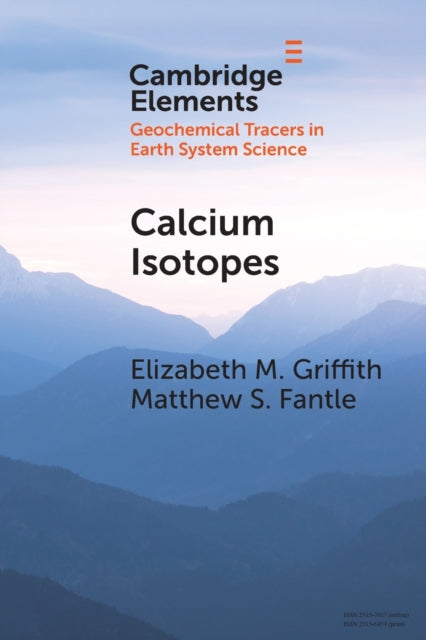Elizabeth M.Griffith,Matthew S.Fantle
Calcium Isotopes
Calcium Isotopes
YOU SAVE £0.86
- Condition: Brand new
- UK Delivery times: Usually arrives within 2 - 3 working days
- UK Shipping: Fee starts at £2.39. Subject to product weight & dimension
Bulk ordering. Want 15 or more copies? Get a personalised quote and bigger discounts. Learn more about bulk orders.
Couldn't load pickup availability
- More about Calcium Isotopes
Calcium isotopes have provided insights into Ca cycling and carbonate diagenesis in marine sedimentary systems, but understanding the impact of multiple factors is crucial for their application as geochemical tracers.
\n Format: Paperback / softback
\n Length: 75 pages
\n Publication date: 21 January 2021
\n Publisher: Cambridge University Press
\n
Calcium (Ca) isotopes have played a pivotal role in unraveling the intricate dynamics of Ca cycling at both global and local scales. By employing precise measurements of Ca isotopes, researchers have been able to quantify the rates of carbonate diagenesis in marine sedimentary systems, shedding light on the intricate processes governing the formation and transformation of carbonate rocks.
However, the effective application of Ca isotopes as geochemical tracers of Ca cycling, carbonate (bio)mineralization, and diagenesis requires a comprehensive understanding of the various factors that can influence Ca isotopic signatures in the rock record. These factors encompass a wide range of variables, including variations in stable isotopic fractionation factors, the impact of local-scale Ca cycling on Ca isotopic gradients in carbonate settings, carbonate dissolution and reprecipitation processes, and the intricate relationship between the Ca isotopic composition of seawater and mineral phases that record the secular evolution of seawater chemistry.
Variations in stable isotopic fractionation factors are a crucial consideration when interpreting Ca isotopic data. These factors, which are influenced by factors such as temperature, pressure, and water composition, can significantly impact the isotopic composition of Ca-bearing minerals. For instance, higher temperatures and pressures can lead to fractionation of heavier isotopes, resulting in an enrichment of lighter isotopes in Ca-bearing minerals. This phenomenon, known as isotopic fractionation, can complicate the interpretation of Ca isotopic data and requires careful consideration.
Local-scale Ca cycling also plays a significant role in shaping Ca isotopic gradients in carbonate settings. The movement of Ca through the marine ecosystem, including processes such as carbonate dissolution, precipitation, and exchange with the oceanic crust, can influence the isotopic composition of carbonate minerals. For example, regions with high rates of carbonate dissolution may result in a depletion of heavier isotopes in carbonate minerals, while regions with high rates of precipitation may lead to an enrichment of heavier isotopes. Understanding the interplay between local-scale Ca cycling and carbonate diagenesis is essential for accurate interpretation of Ca isotopic data.
Carbonate dissolution and reprecipitation processes are also critical in determining the Ca isotopic composition of marine sedimentary systems. These processes involve the breakdown and reformation of carbonate minerals, which can result in the exchange of Ca between different mineral phases. For instance, the dissolution of calcite can release Ca into the aqueous phase, which can then be precipitated as aragonite or dolomite. Similarly, the reprecipitation of calcite from the aqueous phase can result in the exchange of Ca between calcite and aragonite or dolomite. Understanding these processes is crucial for interpreting Ca isotopic data and understanding the evolution of carbonate systems.
Finally, the relationship between the Ca isotopic composition of seawater and mineral phases that record the secular evolution of seawater chemistry is a key aspect of applying Ca isotopes as geochemical tracers. Seawater is a major source of Ca for carbonate minerals, and the isotopic composition of seawater can vary significantly depending on factors such as temperature, salinity, and ocean circulation patterns. Mineral phases that record the secular evolution of seawater chemistry, such as carbonates and evaporites, can also exhibit isotopic variations that are influenced by seawater composition. Understanding this relationship is essential for interpreting Ca isotopic data and understanding the history of seawater chemistry.
In conclusion, precise measurements of the calcium (Ca) isotopes have provided valuable constraints on Ca cycling at global and local scales. By understanding the impact of multiple factors, including stable isotopic fractionation factors, local-scale Ca cycling, carbonate dissolution and reprecipitation, and the relationship between seawater and mineral phases, researchers can effectively apply Ca isotopes as geochemical tracers of Ca cycling, carbonate (bio)mineralization, and diagenesis. This knowledge has significant implications for understanding the Earth's carbon cycle, marine ecosystems, and the evolution of seawater chemistry.
\n Weight: 72g\n
Dimension: 228 x 152 x 6 (mm)\n
ISBN-13: 9781108810760\n \n
This item can be found in:
UK and International shipping information
UK and International shipping information
UK Delivery and returns information:
- Delivery within 2 - 3 days when ordering in the UK.
- Shipping fee for UK customers from £2.39. Fully tracked shipping service available.
- Returns policy: Return within 30 days of receipt for full refund.
International deliveries:
Shulph Ink now ships to Australia, Belgium, Canada, France, Germany, Ireland, Italy, India, Luxembourg Saudi Arabia, Singapore, Spain, Netherlands, New Zealand, United Arab Emirates, United States of America.
- Delivery times: within 5 - 10 days for international orders.
- Shipping fee: charges vary for overseas orders. Only tracked services are available for most international orders. Some countries have untracked shipping options.
- Customs charges: If ordering to addresses outside the United Kingdom, you may or may not incur additional customs and duties fees during local delivery.


